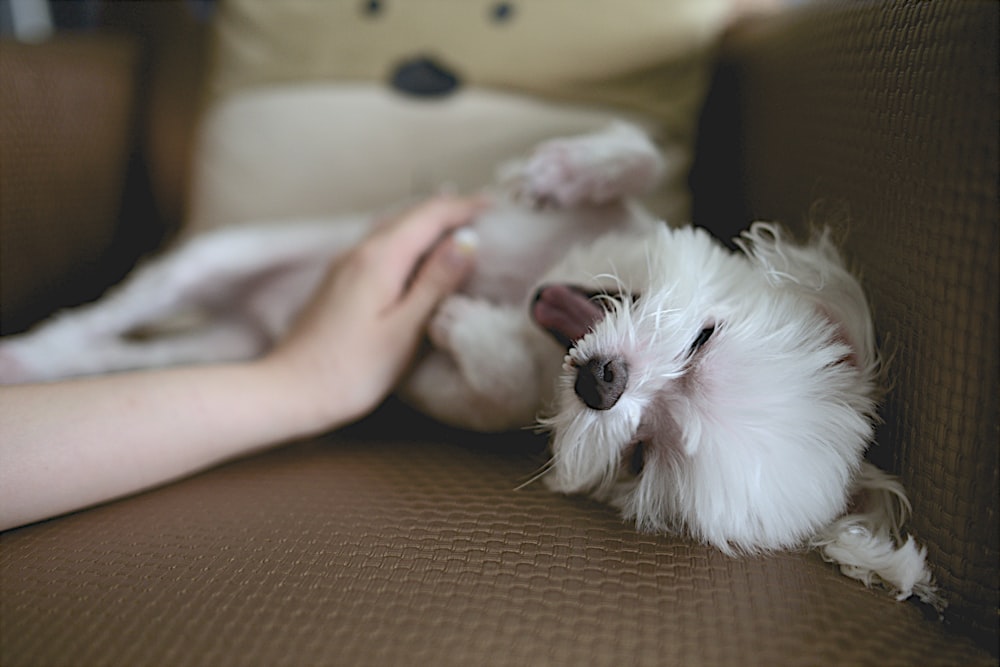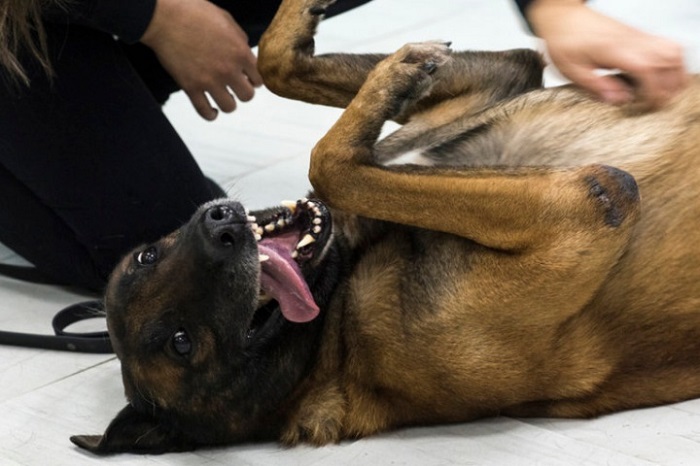
Understanding a dog’s belly and its sensitivity
Dogs have a highly sensitive belly area that is prone to irritation and itchiness. Understanding the nature of their belly and why it is so sensitive can shed light on why they love to scratch and rub it. The skin on a dog’s belly is thinner and more delicate compared to the rest of their body. This makes it more vulnerable to external factors such as parasites, allergies, and irritants. Additionally, the lack of fur in this region exposes the skin directly to the elements, making it more susceptible to environmental irritants.
The belly area is also home to many hair follicles and sebaceous glands. These glands secrete oils that moisturize and protect the skin. However, when the balance of these oils is disrupted, it can lead to dryness and itchiness. Dogs may scratch or rub their bellies as a way to alleviate these symptoms and find some relief.
Furthermore, the belly is a prime spot for parasites like fleas and ticks to latch onto. These pesky critters can cause intense itching and discomfort. Dogs may instinctively scratch or rub their bellies to dislodge these parasites and get rid of the irritation they cause. This instinctual behavior is deeply ingrained in dogs and has been passed down through generations.
Instinctual reasons for dogs scratching and rubbing their bellies
Scratching and rubbing their bellies may be instinctual behavior for dogs that dates back to their wild ancestors. In the wild, dogs would often roll onto their backs and rub against the ground to mark their territory and leave their scent behind. This behavior was a way to communicate with other dogs and establish dominance. Over time, this instinctual behavior has evolved, and dogs now engage in belly scratching and rubbing for various reasons beyond marking territory.
Additionally, dogs have a unique anatomy that makes belly scratching and rubbing an effective way to reach hard-to-reach spots. Unlike humans who can easily scratch their backs with their hands, dogs rely on the ground, their paws, or other objects to satisfy their itch. Scratching their bellies against rough surfaces or using their hind legs to kick and rub allows them to target those persistent itchy areas that they can’t otherwise reach.

Physical reasons for dogs scratching and rubbing their bellies
Apart from instinctual reasons, there are physical factors that contribute to why dogs love to scratch and rub their bellies. One possible explanation is that by scratching and rubbing, dogs stimulate the release of endorphins, which are natural painkillers and mood enhancers. This physical pleasure reinforces the behavior and makes them seek belly scratches and rubs even more.
Furthermore, scratching and rubbing their bellies can provide dogs with a form of tactile stimulation. Dogs have a heightened sense of touch, and the physical contact they receive during belly rubs can be incredibly comforting and soothing for them. It helps create a bond between the dog and their owner, promoting a sense of trust and affection.
Behavioral reasons for dogs scratching and rubbing their bellies
Dogs are social creatures that thrive on attention and interaction with their human companions. Belly rubs and scratches are a form of positive reinforcement that dogs quickly learn to associate with pleasure and reward. When a dog receives a belly rub, they may display behaviors such as wagging their tail, licking their lips, or even rolling further onto their back to encourage more rubbing. This positive reinforcement strengthens the bond between the dog and their owner, making belly rubs a highly desirable experience for dogs.
Additionally, dogs may engage in belly scratching and rubbing as a way to seek attention or express their needs. If a dog is feeling neglected or wants to play, they may roll onto their back and present their belly as an invitation for interaction. It’s their way of saying, “Hey, I want some attention!” This behavior is often seen in puppies, who are more likely to engage in playful belly displays to get their owner’s attention.
Health-related concerns for dogs scratching and rubbing their bellies
While belly scratching and rubbing are normal behaviors for dogs, excessive or persistent scratching can indicate underlying health issues. Dogs may scratch and rub their bellies excessively if they have allergies, skin infections, or even internal health problems. It’s essential for dog owners to pay attention to any changes in their dog’s scratching behavior and consult a veterinarian if necessary.
Allergies, whether caused by food, environmental factors, or parasites, can cause intense itchiness and discomfort in dogs. This can lead to excessive scratching and rubbing of the belly. Skin infections, such as bacterial or fungal infections, can also cause itchiness and inflammation. Internal health problems, such as liver or kidney disease, can manifest as skin issues and trigger excessive scratching. Identifying and addressing the underlying cause of the excessive scratching is crucial for the well-being of the dog.
How to address excessive scratching and rubbing in dogs

If a dog is scratching and rubbing their belly excessively, it’s important to take appropriate steps to address the issue. The first step is to rule out any potential health concerns by consulting a veterinarian. They can perform tests, examine the dog’s skin, and recommend appropriate treatments.
In cases where the excessive scratching is not due to a medical condition, environmental factors may be to blame. Ensuring a clean and hygienic living environment for the dog, using hypoallergenic bedding materials, and avoiding exposure to potential irritants can help alleviate the itchiness. Regular grooming and bathing, using gentle shampoos suitable for dogs, can also help maintain healthy skin and reduce the need for excessive scratching.
Additionally, providing mental and physical stimulation to the dog can help redirect their focus away from excessive scratching. Engaging in activities such as daily walks, interactive play sessions, and puzzle toys can keep the dog mentally and physically stimulated, reducing their need to scratch and rub their bellies out of boredom or frustration.
Tips for providing belly rubs and scratches to dogs
Belly rubs and scratches are not only enjoyable for dogs but also a way to strengthen the bond between dogs and their owners. Here are some tips for providing the best belly rubs and scratches:
- Approach the dog calmly and gently: Dogs are sensitive to their surroundings, so it’s essential to approach them in a calm and gentle manner. Sudden movements or loud noises can startle them and make them wary of belly rubs.
- Read the dog’s body language: Pay attention to the dog’s body language to ensure they are comfortable and receptive to belly rubs. If they tense up, pull away, or show signs of discomfort, it’s best to stop and give them space.
- Start with gentle strokes: Begin by gently stroking the dog’s belly with light pressure. Observe their response and adjust the intensity based on their comfort level. Some dogs may prefer long, sweeping strokes, while others may enjoy gentle circular motions.
- Pay attention to the dog’s reaction: Dogs communicate through their body language, so it’s important to be observant. If the dog leans into the rub, wags their tail, or appears relaxed and content, it’s a sign that they are enjoying the belly rub. However, if the dog seems tense or tries to move away, it’s an indication that they may not be comfortable.
- Be mindful of sensitive areas: Dogs have sensitive areas on their belly, such as the nipples or the region near their hind legs. Be cautious around these areas and avoid applying too much pressure or causing discomfort.
Remember, every dog is unique, and their preferences for belly rubs may vary. Take the time to understand your dog’s individual preferences and adjust your approach accordingly.
Common misconceptions about dogs scratching and rubbing their bellies
There are several misconceptions surrounding dogs scratching and rubbing their bellies that need to be addressed. One common misconception is that dogs only scratch or rub their bellies when they have fleas. While fleas can certainly cause itchiness and prompt dogs to scratch, it’s not the only reason dogs engage in belly scratching and rubbing. As discussed earlier, dogs scratch and rub their bellies for a variety of reasons, including instinctual, physical, and behavioral factors.

Another misconception is that dogs only scratch or rub their bellies when they are in distress or experiencing discomfort. While excessive scratching can indeed be a sign of underlying health issues, it’s important to differentiate between normal, occasional belly scratching and excessive or persistent scratching. Dogs may scratch or rub their bellies simply because it feels good or as a way to seek attention and interaction with their owners.
Conclusion: Celebrating the joy of dogs scratching and rubbing their bellies
The reasons behind why dogs love to scratch and rub their bellies are multifaceted. It’s a behavior that stems from both instinctual and physical factors, as well as the pleasure and attention they receive from their owners. Understanding the nature of a dog’s belly and its sensitivity helps us appreciate why dogs find belly rubs and scratches so enjoyable.
As responsible dog owners, it’s crucial to pay attention to our dogs’ scratching behavior and address any excessive or persistent scratching. This includes ruling out any underlying health concerns and creating a conducive environment for our furry friends. Providing appropriate mental and physical stimulation, along with gentle belly rubs and scratches, can enhance the well-being and happiness of our canine companions.
So the next time your dog rolls onto their back, inviting you for a belly rub, embrace the opportunity to show them love and affection. Celebrate the joy that dogs find in scratching and rubbing their bellies, and cherish the moments of pure canine bliss that they bring into our lives.
